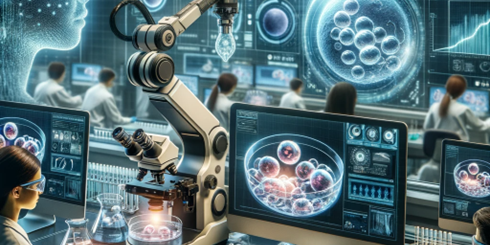Many couples struggle with infertility. It’s an emotional rollercoaster full of hope and worry. Dr. Hrishikesh Pai, India’s one of the top IVF specialist in India, helps couples become parents. He’s always updating his methods with new tech to give patients the best care.
In IVF, choosing the best eggs and embryos is super important. This choice can make or break a pregnancy’s success. Now, a new player: “artificial intelligence in IVF” can now be a game changer. Dr Pai and other experts believe AI could change the game for IVF.
Artificial Intelligence (AI) is being employed to improve the success rates of IVF. AI-driven technological breakthroughs are being seen in the IVF space. Also, it’s believed that AI can help increase the average success rate of IVF, which has been around 45%. The success rate of IVF tends to decline in aging women.
Artificial Intelligence in Embryo Selection
In the intricate journey of IVF, selecting the right oocyte and embryo is very important for its success. In this segment, artificial intelligence (AI) is transforming fertility treatments.
According to Dr. Hrishikesh Pai, “AI-based fertility treatment introduces a level of precision. AI helps embryologists to analyse volumes of data to make better decisions during embryo selection.”
Let’s break down AI’s magic touch in IVF and learn more about how AI integrates into this procedure:
- Data Collection: AI programs use vast datasets which include images of thousands of embryos at different development stages and their specific outcomes, like
- successful implantation
- pregnancy
- live birth
- Image Analysis: AI programmes use time-lapse microscopy and other advanced imaging techniques to capture continuous images of developing embryos. AI algorithms then analyze these images to track and assess embryonic development.
- Embryo Grading: Human embryologists check and grade based on shape and cell division rates. But, with AI, it is possible to analyze and identify patterns and subtle features that humans might find complex or time-consuming to notice
- Predictive Analysis: AI-based programmes can perform a comparative analysis and predict an embryo’s chance of resulting in a successful pregnancy. This ability to forecast is beneficial when choosing the best embryos for transfer.

Ready for the future of fertility treatments? 🚀 Dive into the world of Artificial Intelligence in Embryo Selection.
AI in oocyte and embryo selection helps shape the future of IVF, making embryo choices smarter and more precise. Most embryologists rely on AI to assist them in looking out for the best potential babies-to-be.
Dr. Hrishikesh Pai explains, “With AI in fertility, we’re catching details that can go unnoticed. It’s like having a super-powered magnifying glass that spots patterns in tons of data.”
AI’s helping hand could be the game-changer in your IVF journey.
Ready to embrace the future and boost your chances? Let’s get started.👇
Take the Next Step with AI IVF!
The integration of artificial intelligence in embryology enhances both efficiency and efficacy. It holds great promise for the future of ART.
Let’s look at how AI is different from the traditional IVF process!
Read on to learn all about why IVF experts rely on AI in Oocyte and Embryo Selection
Benefits and Advantages of AI in Oocyte and Embryo Selection
AI in embryology comes with its share of benefits and advantages, enhancing the outcomes and efficiency of IVF treatments.
Here’s how AI differs from the traditional IVF process in the context of oocyte and embryo selection:
| AI | Traditional IVF | |
| Enhanced Precision: | Detects subtle patterns and features in embryos, leading to more precise assessments. | The IVF expert looks at the embryo and might overlook some key details. |
| Consistency | Offers uniform evaluations, eliminating discrepancies due to human judgment or fatigue. | The IVF expert looks at the embryo and might overlook some key details. |
| Data-driven Decisions | Grounds its decisions on vast datasets, ensuring evidence-based conclusions. | The embryologist chooses the oocyte and embryo based on their experience and observation. |
| Time Efficiency | Rapidly analyses embryo development patterns | A time-consuming procedure as embryologists perform manual assessments, which need more time. |
| Predictive Analysis | Predicts an embryo’s potential for successful implantation based on large-scale historical data. | Decisions are based on current observations and experience, not extensive predictive analytics. |
| Reduced Subjectivity | Offers evaluations, minimizing biases. | Evaluations are influenced by individual embryologist opinions and experiences. |
| Continuous Learning | Refines its accuracy with incoming data | Embryologists update knowledge through periodic research and professional development. |
| Improved Success Rates | By optimizing selection it can enhance the chances of successful pregnancies | Success is highly dependent on embryologist expertise and the specific protocols of the clinic. |
| Personalized Treatment | Some models tailor analysis based on individual patient histories | Personalization depends on the medical team’s clinical judgment. |
| Comprehensive Analysis | An all-inclusive view through a simultaneous evaluation of various parameters. | Focuses on specific morphological characteristics during set assessment periods. |
| Integration with Advanced Imaging | Integrates with technologies like time-lapse microscopy | Relies on standard microscopy and periodic observations by embryologists. |
While AI presents many advantages, it’s essential to understand that its role is to supplement embryologists’ expertise, not to replace it. Combining human expertise with AI’s capabilities offers a promising future for IVF treatments.
Latest IVF technologies used at BLOOM IVF
BLOOM IVF presents a new, efficient and precise paradigm in reproductive medicine, which is a fusion of Artificial Intelligence (AI) with traditional IVF procedures
- AI in Embryo Selection: BLOOM IVF adopts smart AI- algorithms to locate and select the highest-quality oocytes and embryos. It promises greater accuracy, enhancing the likelihood of successful implantations.
- AI in Ovarian PRP Treatment: At BLOOM IVF, AI-driven insights in the Ovarian PRP treatment improves outcomes for patients with low ovarian reserve, Low AMH, or a thin endometrium.
- AI in Stem Cell Treatment: AI helps doctors treat patients by using stem cells to rejuvenate reproductive tissues potentially. The infusion of AI with stem cell therapy is useful for patients with thin endometrium or Low AMH
- AI in Embryoscope: The AI-driven Embryoscope ensures that embryos remain in their ideal environment, making real-time assessments without external disruptions. BLOOM IVF Centre in India boasts of continuous monitoring of embryo through AI-integrated Embryoscope.
- AI in PGT – A: Incorporating AI in Preimplantation Genetic Testing for Aneuploidies (PGT-A) scans for chromosomal anomalies, ensuring only the healthiest embryos progress to the transfer stage. Though this, the outcome of an IVF cycle is likely to be clear and without complications.
- Dr. Hrishikesh Pai relies on and recommends AI in Preimplantation Genetic Testing for Aneuploidies (PGT-A). It ensures an exhaustive search for chromosomal discrepancies and chooses only top-quality embryos for transfer.
- Dr. Pai believes, “Using AI in PGT-A isn’t just about technology; it’s about giving families the best chance for a healthy start.”
Ready to take that next step with Dr. Pai and AI by your side? Your journey to parenthood just got a futuristic boost!
AI in Sperm VD:
Facing hurdles like a low sperm count? Using AI technology, Sperm VD at BLOOM IVF selects the healthiest sperm, increasing pregnancy chances.
AI’s Effect on IVF Success Rates:
Artificial intelligence (AI) is being employed to improve the success rates of IVF. Advancements in AI are improving IVF success rates, which currently decline as women age.
FAQ
How is AI enhancing the future of IVF in India?
The collaboration between AI and IVF is redefining fertility treatments. With India’s medical facilities rapidly integrating advanced technologies, AI is likely to elevate IVF success rates in the country. Aspiring parents can hope to benefit from the most advanced care available.
How does AI improve the accuracy of preimplantation genetic testing (PGT)?
AI amplifies the efficiency of PGT by analyzing genetic data swiftly and thoroughly. It detects congenital abnormalities and selects embryos with ideal genetic traits with great precision.
In what ways does AI’s predictive analytics benefit IVF procedures?
AI’s predictive capabilities are transformative as they help to
- Improve hormone stimulation methods,
- Personalise treatments based on a patient’s history, and
- Enhance sperm selection for ICSI
Through these parameters, IVF specialists can deliver customised and successful treatments.
With the integration of AI in fertility treatments, how will it affect the patient’s journey towards parenthood?
AI is being used more in fertility treatments to make it easier for people to become parents. With refined procedures and heightened success rates, patients will experience more efficient and effective paths to conception.

